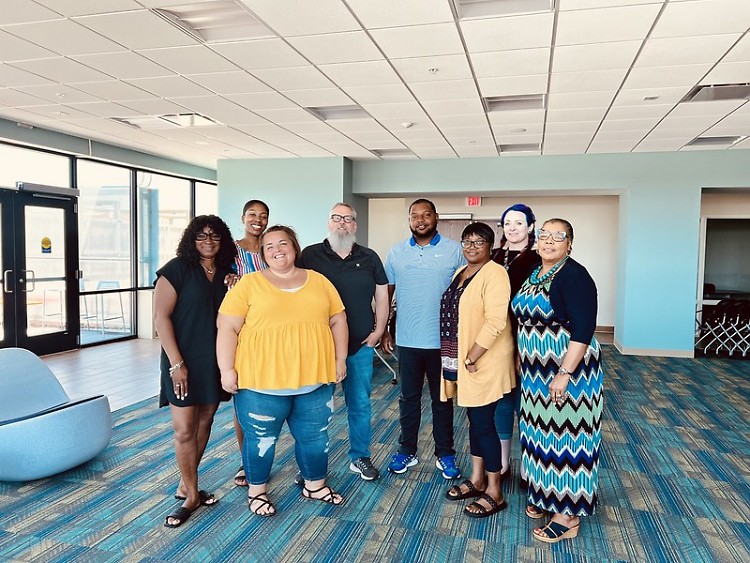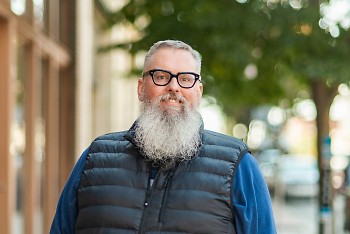Dwelling Place’s promise to the community is to provide housing for all. However, meeting the community’s housing needs isn’t just about building more apartments and homes. While affordable housing is part of the solution, many residents need support services to maintain housing. Some of the community's most vulnerable people face mental illness, chronic health problems, or a history of trauma; obtaining and maintaining safe, decent, and stable housing can be challenging, and living without stable housing can drastically worsen their wellbeing. This is why Permanent Supportive Housing was created, and at Dwelling Place, Resident Services Coordinators play a vital role in bringing these services to those who need them.
Dwelling Place's Resident Services Coordinators (RSCs) offer voluntary services to connect people with the additional resources and support needed to maintain their housing. Lisa Blackburn has been an RSC for thirteen years. "These residents have found challenges in other housing and need additional support to maintain their housing." She primarily works with families and domestic violence survivors. According to Blackburn, her residents enter supportive housing "looking for a hand-up, not a hand-out." She works with them individually to set and achieve their goals.
Brain Bruce, an RSC at Commerce Courtyard for the last four years, works with many individuals who have been homeless for a year or more and many who have mental illnesses or other disabilities. He states, "Most of these individuals come off the street with nothing, and the resident services coordinator's role is to step in and help them access furniture and other basic needs." To support this effort, Dwelling Place offers welcome home baskets containing essential household items given to residents when they move in. Also, the RSCs walk alongside them to support them to teach them how to be self-sufficient and utilize the resources they need to maintain their housing.
These services are vital to the community; research shows that most people who live in supportive housing can stay stably housed in the community with staff support, such as Dwelling Place's Resident Services Coordinators, who utilize numerous other community resources. Blackburn and Bruce agree with these findings and report that permanent supportive housing enables the resident to be more self-sufficient because they get more individualized guidance to address the reasons that led them to become homeless. In addition, Bruce states that "individuals coming from homelessness who may not be successful living in market-rate housing with the additional support that comes with living in permanent supportive housing stay housed longer or indefinitely." Long-term or indefinite housing is the goal of permanent supportive housing, by working with the individual to determine what led to them being homeless in the past and prevent this from reoccurring. This often means connecting the resident to the needed community resources, helping them obtain and maintain a stable income, rental assistance programs, physical and mental health systems, and substance abuse treatment programs to help them overcome the barriers they faced in the past that led to them becoming homeless.
The residents also agree that having a person walk alongside them and address the barriers that led to them being homeless in the past is beneficial. In speaking with residents about their experiences living in supportive housing, they agree that having someone there to offer day-to-day support helps improve their quality of life.
Dwelling Place offers Permanent Supportive Housing with on-site Resident Services Coordinators and working with numerous community partners to support residents who are recently homeless, individuals fleeing domestic violence, and people with disabilities or mental health conditions. RSCs are there to ensure they receive appropriate support to improve their quality of life. This ties into Dwelling Place's belief that "Everyone Deserves A Dwelling Place" and creates an environment where all residents, despite the challenges they have faced in the past, feel cared for, respected, and uplifted.
With a mission to improve the lives of people by creating quality affordable housing, providing essential support services and serving as a catalyst for neighborhood revitalization, Dwelling Place serves families and people in 4 counties across West Michigan. Dwelling Place is powered by volunteers and numerous staff persons, guest writers create our Rapidian content. Thanks to Lillian Henley, AmeriCorps VISTA for her contribution of this piece.
The Rapidian, a program of the 501(c)3 nonprofit Community Media Center, relies on the community’s support to help cover the cost of training reporters and publishing content.
We need your help.
If each of our readers and content creators who values this community platform help support its creation and maintenance, The Rapidian can continue to educate and facilitate a conversation around issues for years to come.
Please support The Rapidian and make a contribution today.


